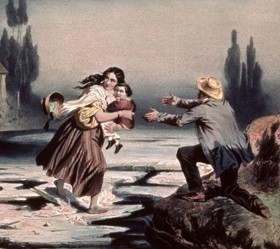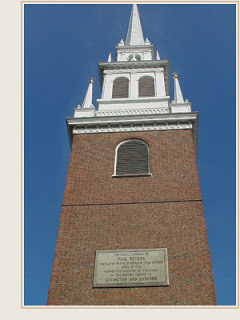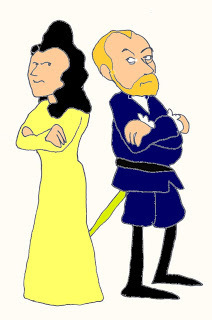Man Martin's Blog, page 199
May 13, 2012
Mothers' Day
It has been ten years this month since I lost my own dear mother.
Mur, we called her.
I realize now how much she shaped my life.
She was the first sounding board for my writing and promised to be my biggest fan and harshest critic. And she was.
She taught me so many things: reading, chess, palmistry, poetry.
And always to march to the beat of my own drummer.
By always marching to the beat of hers.
Mur, we called her.
I realize now how much she shaped my life.
She was the first sounding board for my writing and promised to be my biggest fan and harshest critic. And she was.
She taught me so many things: reading, chess, palmistry, poetry.
And always to march to the beat of my own drummer.
By always marching to the beat of hers.
Published on May 13, 2012 03:30
May 12, 2012
Killer Openings
 By "killer" I mean openings that kill your chances with an agent.
By "killer" I mean openings that kill your chances with an agent.Agents must read through mountains - this is no hyperbole - of manuscripts, and learn to skim first pages with an eagle eye for any warning sign that says they need bother proceeding no further. At the Grub Street Writers' Conference, where I recently presented thanks to the kind offices of my agent, Sorche Fairbank, one session was called "Literary Idol," a hilarious, brutal, and very useful exercise. Writers submit first pages of manuscripts, which a professional actor reads for a panel of three agents. As agents hear a line at which they would stop reading, they raise their hands. When two hands go up, the reading stops and the agents explain their reactions. I don't know how many pages were started, but it was quite a few, and only two pages made it all the way to the end. Here are some things I learned.
Six Ways to Kill a Story on the Opening Page
1. Cliches. Not too many of these showed up, but agents get more tired of these then the rest of us, being subjected as they are, to more frequent doses. The problem is, readers are more apt to know when they're reading a cliche than a writer is when he's writing one. Someone ought to invent something akin to a grammar checker that would also check for cliches.
2. Starting stories with someone waking up. The alarm clock ringing is a logical way to start the morning, but not such a hot way to start a story.
3. Over-the-top emotional reactions. If you've got a scene fraught with emotional intensity - Joe says he wants a divorce, Barb says she needs an operation - that's all fine, but the reaction to it has to be measured and believable. One agent referred to it as "amping up." Don't amp up the scene with corny histrionics like screaming, throat clutching, tears rolling down cheeks, etc.
4. Lenghty description. More than once, the panel of agents called a halt to a piece which was actually quite nicely written but devoted a paragraph to the wind outside, or the color of the leaves, or some such. In general I find you want description folded into the action any way.
5. Paying attention to the wrong stuff. If there's a lengthy expostion about the family cat, for example, and the agent senses the story isn't about the cat, the agent's going to figure you don't know what the story is about. One agent advised knowing in advance what you want each scene to accomplish and sticking to that.
6. Purple writing that misses the mark. Heavy alliteration and mangled metaphors tell an agent you're trying hard but not successfully. Tell a good story and tell it clearly is usually the best thing.
Published on May 12, 2012 02:49
May 11, 2012
Biographical Notes: Part One, The Early Years
I have compiled these brief notes in hopes that when I achieve the pinnacle of fame, which seems my natural destiny, some future biographer will find them useful.
Man Martin was born in Ocala, Florida, in 1959, where his father was a high-ranking official, and his mother, a famous (some say infamous) socialite and taste-maker whose salon was considered de rigeur in the demi-monde of the Central Florida literary set. During the anarchist uprising of '66, an assassin's bullet found Martin's father in the midst of composing his great monograph exploring the genus of the cabbage palm, and Martin's mother fled with Man and his sisters - his brother Homer had already enlisted in the Resistance where he would win several medals of valor and the Distinguished Service Pin - to Fort Pierce, where she opened a fashionable tea room, serving, among others, Marcel Proust, Ernest Hemingway, and Frank Zappa. But two years later, the Germans rolled in, and the Martins had to flee once more. Man, nine years old by this time, had already written his first novel, and Gertrude Stein, one of his mother's patrons, who'd seen an unpublished manuscript, pronounced it a "work of genius." Unfortunately, in the hurry and confusion, the manuscript was left behind. Ezra Pound, who briefly occupied the house in the summer of '70 is believed to have found Martin's incohate notes and used them to fashion his own masterpiece, Look Homeward Angel, which he published under the pen name of Herman Melville.
 By this name, the young Man Martin had
By this name, the young Man Martin had
already written several novelsMan's sister Helen had meanwhile discovered radium and won the Nobel Prize; unfortunately, owing to a bureaucratic mix-up, the check was sent to the neighbors, and times were tough for the Martins. Within two short years, they'd eaten the last of their sled dogs, and were seriously considering a case of pickled beets they had in the pantry and whether anything could be done to make these edible. Man's middle sister, Chris, writing under the pen name of George Eliot, had written some unflattering limericks about the commissar, in which she compared his nose to a corndog. The family had to flee once more, but by this time, they'd done so much fleeing, they were getting used to it. Chris changed her name to Nettie and embarked on an ambitious project to level the Taj Mahal and build an exact replica in the precise spot where it had once stood without anyone noticing. It is unclear whether she ever succeeded. Meanwhile Man had written five more novels and an opera. Alas, the notes for these were also left behind, and when Man asked could they please go back and get them, his mother said, they couldn't turn back now, and he should have thought of that before they fled, and he'd leave his own head behind if he didn't have it screwed on tight. The novels were later found by Wagner who turned them into operas. George Bernard Shaw found the opera and turned it into a play. This was was later adapted into a novel by Thomas Pynchon. The film version comes out this Spring.
NEXT: Adolescence, A Troubled Time
Man Martin was born in Ocala, Florida, in 1959, where his father was a high-ranking official, and his mother, a famous (some say infamous) socialite and taste-maker whose salon was considered de rigeur in the demi-monde of the Central Florida literary set. During the anarchist uprising of '66, an assassin's bullet found Martin's father in the midst of composing his great monograph exploring the genus of the cabbage palm, and Martin's mother fled with Man and his sisters - his brother Homer had already enlisted in the Resistance where he would win several medals of valor and the Distinguished Service Pin - to Fort Pierce, where she opened a fashionable tea room, serving, among others, Marcel Proust, Ernest Hemingway, and Frank Zappa. But two years later, the Germans rolled in, and the Martins had to flee once more. Man, nine years old by this time, had already written his first novel, and Gertrude Stein, one of his mother's patrons, who'd seen an unpublished manuscript, pronounced it a "work of genius." Unfortunately, in the hurry and confusion, the manuscript was left behind. Ezra Pound, who briefly occupied the house in the summer of '70 is believed to have found Martin's incohate notes and used them to fashion his own masterpiece, Look Homeward Angel, which he published under the pen name of Herman Melville.
 By this name, the young Man Martin had
By this name, the young Man Martin had already written several novelsMan's sister Helen had meanwhile discovered radium and won the Nobel Prize; unfortunately, owing to a bureaucratic mix-up, the check was sent to the neighbors, and times were tough for the Martins. Within two short years, they'd eaten the last of their sled dogs, and were seriously considering a case of pickled beets they had in the pantry and whether anything could be done to make these edible. Man's middle sister, Chris, writing under the pen name of George Eliot, had written some unflattering limericks about the commissar, in which she compared his nose to a corndog. The family had to flee once more, but by this time, they'd done so much fleeing, they were getting used to it. Chris changed her name to Nettie and embarked on an ambitious project to level the Taj Mahal and build an exact replica in the precise spot where it had once stood without anyone noticing. It is unclear whether she ever succeeded. Meanwhile Man had written five more novels and an opera. Alas, the notes for these were also left behind, and when Man asked could they please go back and get them, his mother said, they couldn't turn back now, and he should have thought of that before they fled, and he'd leave his own head behind if he didn't have it screwed on tight. The novels were later found by Wagner who turned them into operas. George Bernard Shaw found the opera and turned it into a play. This was was later adapted into a novel by Thomas Pynchon. The film version comes out this Spring.
NEXT: Adolescence, A Troubled Time
Published on May 11, 2012 02:18
May 10, 2012
The Freedom Trail
 The Old North Church, whence Robert Newman
The Old North Church, whence Robert Newmanheld up two lanterns, not as a signal to
Paul Revere, but as an additional signal to
the Colonists that the Regulars were coming.
(The British soldiers) When Newman got
down, British soldiers were trying to break in
the door to find out what was happening, so
he scooted out the back window by the altar,
called a "Newman" to this day in his honor.I spent the weekend in Boston, where I presented at the Grub Street Writers' Conference. I arrived early, with the express purpose of taking a walking tour of the "Freedom Trail" a two-and-a-half mile long course, passing some of Boston's most famous sites. I didn't hire a tour guide, but, especially in the early parts of the trail, encountered groups of school kids led by somebody in broadcloth and a tricorn hat or some other period costume declaiming about some point of history. In the graveyard where the victims of the Boston Masacre, Paul Revere, Sam Adams, and John Hancock are buried I got to overhear three times about the inaccuracy of Longfellow's line, "The British are coming! The British are coming!" The standard joke at this among tour guides is that it would be like someone shouting, "The Americans are coming! The Americans are coming!" One tour guide improvised with "The Humans are coming! The Humans are coming!"
It would be easy to go on in this vein, waxing comic about Boston's history, and there is something deeply silly about walking two miles to stand in front of a building where something happened two hundred years ago. But by golly, I won't make fun of this. Who's the poet who said, "Lives there a man with soul so dead that never to himself hath said, 'this is mine own, my native land'?" Any American who isn't stirred to walk the streets of Boston just needs more stirring, that's all. When people were just starting to consider the possibility of genuine rights, the Bostonians got it. They opened the first public school in the colonies, stipulating that Indians be educated free. In the same burial ground as John Hancock, so wealthy he once tossed gold coins at passersby from his phaeton, lie African Americans like Crispus Attucks and Phyllis Wheatley. Bostonians fought from mixed and often far from honorable motives, but it also produced men like John Adams who acted as lawyer on behalf of the British prosecuted for the Boston Massacre. They were not afraid, the best of them, to give their lives, their fortunes, their sacred honor. Walking the Freedom Trail reminded me of the best of what it means to be American. God bless Boston.
Published on May 10, 2012 02:24
May 9, 2012
Maurice Sendak 1928-2012
 I am not the only blogger today who will write about Maurice Sendak.
I am not the only blogger today who will write about Maurice Sendak.I was seven or eight years old when my mother came home from the Ft. Pierce city library saying, "You're going to love this book!"
You will not need to wonder what book it was.
My mother's favorite part - always a poet at heart - was the line where Max sailed in and out of weeks, and for most people it was the monsters - "Let the wild rumpus begin!" - but for me it was the transformation of Max's room into a jungle: the dresser and wall paper that sprouted into lush undergrowth as Max danced, astounded at his own good luck or else his incantatory powers.
Sendak never equalled that book. He continued prolific, and his last book was published only eight months before his death, but it is for Where the Wild Things Are he will be remembered. To create a classic is no small thing.
Published on May 09, 2012 02:54
May 8, 2012
Tom Lerher
I thought of Tom Lehrer the other day, and decided to share this videos. Lehrer, a math teacher at Harvard, wrote a series of classic satiric songs for a show called That Was the Week That Was. I owned Lehrer's records and listened to them, as a friend expressed it, "until the needle wore through the other side." Tom Lehrer was like a Mad Magazine parody brought to life, he was my introduction to Gilbert and Sullivan before I'd heard of Gilbert and Sullivan. Listen to "The Vatican Rag;" can you imagine The Capitol Steps - that rather insipid parodic group - coming up with anything this inspired? Many of his songs were topical, such as this one, but he also wrote morbid delights such as "I Hold Your Hand in Mine" and "My Hometown." What's even better - I cannot say why this should matter - Lehrer looks exactly as I hoped. When I first saw Robert Benchley, after reading his sprightly essays, I was taken aback by a pudgy, moustached man, instead of the wiry lunatic I imagined must travel on stilts. I still haven't gotten over Garrison Kiellor. But hearing Lehrer, you imagine a cross between Harold Lloyd and Groucho Marx. And by golly, that's just what he looks like.

Published on May 08, 2012 02:16
May 7, 2012
May 6, 2012
Opening the Pool
 I will say this one time, and one time only, so listen up.
I will say this one time, and one time only, so listen up.Anyone who owns a pool is a major dumb-ass.
They are ruinously expensive, not only in terms of money outlay for chemicals, equipment repair, water, but in man and woman hours. Nancy and I recently opened the pool. Pulling back the cover which had concealed it all winter, we found 50,000 gallons of green water, filled with an assortment of leaves, pollen, miscellaneous crap, and one poor drowned squirrel who evidently found life too hard to bear and took the coward's way out. Then began, as Shakespeare puts it, the tempest to my soul. Nancy and I began to vacuum the sucker out. This means running a nozzle along the bottom of the pool as it drains out your water and sucking out leaves and detritus at a rate of one fistful every twenty minutes. Did I mention we have a 50,000 gallon pool? The procedure is monstrously tedious. I once heard about a Zen master who trained his students to have patience by mixing sacks of barley, wheat, and rice, and having his students separate them back out with chopsticks. Cleaning the pool is more tedious than that, with the added benefit you have to do it standing up. In fact, I'm considering renting out the pool when we open it to prospective Zen masters. Nah. A Zen master wouldn't be able to take it. He'd go nuts.
When I was a child in Fort Pierce, Florida, we had a pool. I was only seven at the time, so my responsibilities were not running on the pool deck and lying with a straight face if anyone asked if I'd peed, so I didn't understand when my mother, Mur, would complain about it. Years later, when we moved to Sandersville, Georgia, Mur had a dream, which she told me about. In her dream she was relaxing in a chaise lounge, sipping a gin-and-grapefruit. There was a beautiful, kidney-bean shaped pool with sparkling azure water. The pool deck was bordered by mimosa trees, and Mur sipped her gin-and-grapefruit, watching the pink and white parasol-shaped flowers drift through the air and alight on the water, sending out delicate ripples in all directions.
A nightmare, she said.
Published on May 06, 2012 02:20
May 5, 2012
Much Ado About Nothing
 Benedick and Beatrice
The other night I took my wife out on a date. This is kind of a big deal. When you've been married thirty years, it's easy to forget how to set up a date. But a friend of mine at school, Manning Kent, reminded me how important it is to find ways to renew the fun in a relationship, so I told Nancy to clear her calendar for Saturday night, and made us reservations at the Shakespeare Tavern. As it turned out, we had something to celebrate - we found a tenant for our condo. When we left for the show, I programmed our destination into the GPS, so it gave us turn-by-turn directions. I honestly think Nancy was surprised when we arrived at the Shakespeare Tavern. I know she was pleased. If you live in Atlanta, or visiting, and you've never been to the Shakespeare Tavern, you really should go. It's very casual, as Shakespeare should be; you eat dinner and watch a play, usually a production of Shakespeare. We had a nice dinner, drank some beer, and watched Much Ado About Nothing. It's a good show for a date; Benedick and Beatrice, played by Andrew Houchins and Erin Considine, got the best laughs, but the villain, Don John, played by Jacob York, was my favorite. There's something so cool about a Shakespearean villain. They actually going around saying things like, "I'm a villain," and York clearly savored every evil moment. Don John is an Iago-type villain who pretends to be your best friend and have your interests at heart, just so he can get in your head and destroy your peace of mind. Anyway, everything comes out alright in the end, although I can never get over the fact that Hero marries Claudio even after all the crap he said about her, but then, how else can you end it? But the best part of the play, the very best part, was getting to watch it with Nancy.
Benedick and Beatrice
The other night I took my wife out on a date. This is kind of a big deal. When you've been married thirty years, it's easy to forget how to set up a date. But a friend of mine at school, Manning Kent, reminded me how important it is to find ways to renew the fun in a relationship, so I told Nancy to clear her calendar for Saturday night, and made us reservations at the Shakespeare Tavern. As it turned out, we had something to celebrate - we found a tenant for our condo. When we left for the show, I programmed our destination into the GPS, so it gave us turn-by-turn directions. I honestly think Nancy was surprised when we arrived at the Shakespeare Tavern. I know she was pleased. If you live in Atlanta, or visiting, and you've never been to the Shakespeare Tavern, you really should go. It's very casual, as Shakespeare should be; you eat dinner and watch a play, usually a production of Shakespeare. We had a nice dinner, drank some beer, and watched Much Ado About Nothing. It's a good show for a date; Benedick and Beatrice, played by Andrew Houchins and Erin Considine, got the best laughs, but the villain, Don John, played by Jacob York, was my favorite. There's something so cool about a Shakespearean villain. They actually going around saying things like, "I'm a villain," and York clearly savored every evil moment. Don John is an Iago-type villain who pretends to be your best friend and have your interests at heart, just so he can get in your head and destroy your peace of mind. Anyway, everything comes out alright in the end, although I can never get over the fact that Hero marries Claudio even after all the crap he said about her, but then, how else can you end it? But the best part of the play, the very best part, was getting to watch it with Nancy.
Published on May 05, 2012 03:01
May 4, 2012
Another Reason I Never Made It as a Cartoonist
Published on May 04, 2012 02:17




